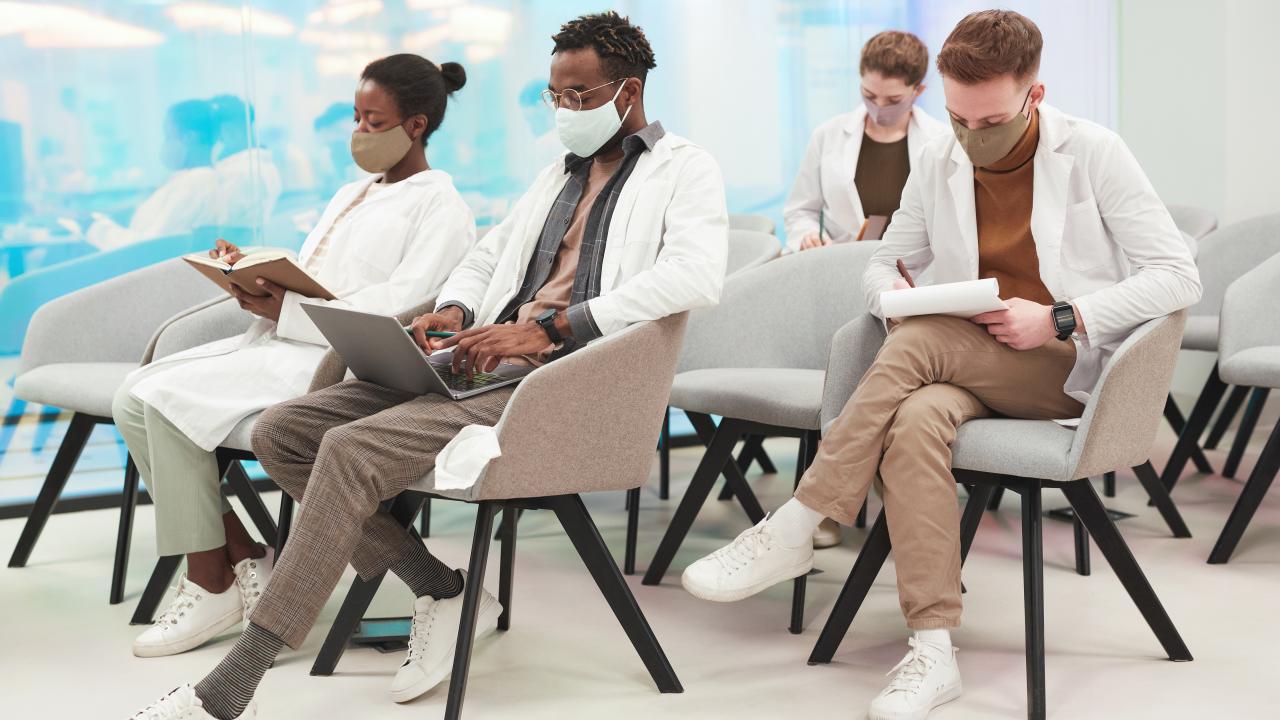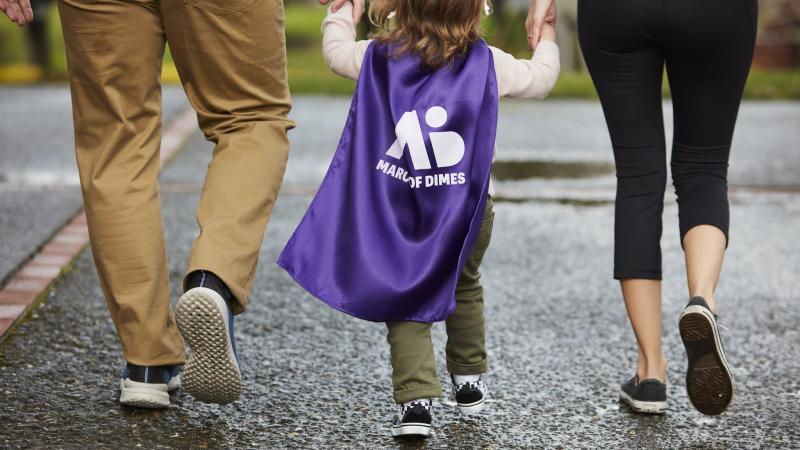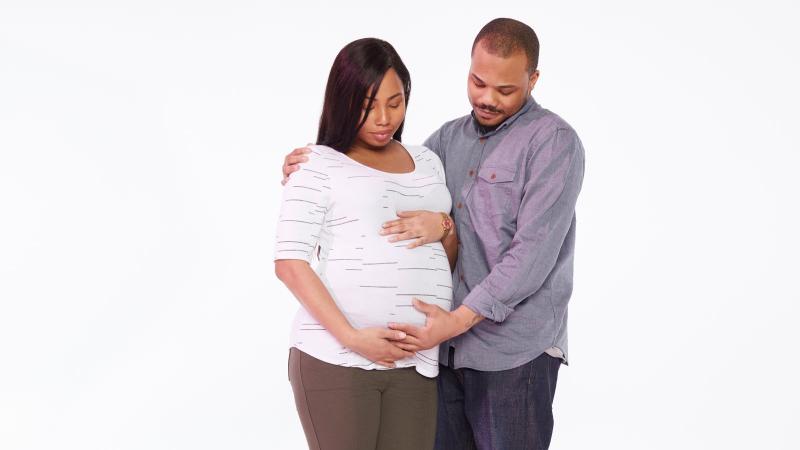The RSDP program is more flexible in terms of research proposals
Due to its focus on young scientists who may not have had rigorous experience or training in scientific inquiry or publication, recipient acceptance into the program does not imply a need to conduct and publish novel, breakthrough scientific work in the OB/GYN space, as this in and of itself is rare. Rather, the program is a March of Dimes effort to recognize and strengthen the wide breadth of human talent in the OB/GYN field and spark a lifelong confidence, passion and commitment to maternal fetal health research that will undoubtedly change not only clinical outcomes, but lives, in the decades to come.
As such, research proposals must be translational in nature and relate to the field of maternal fetal health – with a focus on prematurity, maternal and infant morbidity and mortality and health equity – but the outcome of the work is less important than the training and shaping of the recipient during the grant period.
This program is administrated by a host institution and is funded by a coalition of organizations including the March of Dimes, with coalition members pooling funding to support the research work of about a dozen grant recipients annually, the grant structure has recently changed, with each coalition organization funding a specific recipient.
|
Award Amount: $250,000 over two years in salary support Areas of Research: obstetrics and gynecology and their subspecialties (e.g. reproductive endocrinology and infertility) Open to: a MD/DO degree and OB/GYN residents near completion of residency or near completion of subspecialty fellowship |
For program year 2025: Notification of Acceptance: no later than September 30, 2024 This grant is managed by the host institution of the RSDP. Learn How To Apply |
Must be seeking a career in academic obstetrics and gynecology research. Applicants must be near completion of their residency in obstetrics and gynecology or in their subspecialty fellowship. Any individual with the skills, knowledge, and resources necessary to carry out the proposed research is invited to work with their institution to develop an application for support. Individuals from underrepresented racial and ethnic groups as well as individuals with disabilities are always encouraged to apply. Potential applicants should promptly contact the RSDP office, as should the sponsoring Department Chair.
- M.D. or D.O. degree.
- U.S. citizen, noncitizen national, or been lawfully admitted for permanent residence and possess an Alien Registration Receipt Card (I-151or I 155) or some other verification of legal admission as a permanent citizen at the time of the award.
- Completion of a four-year internship and residency in obstetrics-gynecology approved by the Accreditation Council for Graduate Medical Education or the Royal College of Physicians and Surgeons of Canada by the time the RSDP training would begin.
- Prior laboratory experience is not a requirement for applicants, although a research proposal is required as part of the application.
Note: This application process is managed by the host insitition of the RSDP program. March of Dimes does not manage this application process.
Before submitting this application, RSDP requires that the applicant submit a letter of intent to the
RSDP office indicating: name of Department of OB/GYN sponsor, name and address of proposed scientific mentor, and brief description of the proposed research project. This will be reviewed by the Program Director and feedback will be provided to potential applicants. RSDP advises that applicants contact the RSDP office by phone or Email to confirm eligibility requirements prior to submission of a letter of intent or an application.
Application deadlines to begin program for July 2025:
Receipt of Letter of Intent: May 15, 2024
Receipt of Application: July 1, 2024 by 5:00 pm ET
Selection: Interviews of candidates by the Selection Committee will take place in August/September at a time and location to be announced. Travel to the site for interviews is the responsibility of the sponsoring OB/GYN Department.
Applicants will be notified of their acceptance to the program no later than September 30, 2024.
Electronic copy of the entire proposal must be submitted via email as a single .pdf document and sent to Amanda Heflin at [email protected]
The original hard copy application (with original signatures) should sent to:
Reproductive Scientist Development Program
c/o Amanda Heflin, Dept. of OB/GYN
710 E 2nd South, Mt. Olive, IL 62069
If you have questions, please e-mail: Amanda Heflin at [email protected]
Please include the following:
- Completed application form: (available at https://www.rsdprogram.org/about)
- Applicant Color Photo
- Statement from Applicant to include: (1) Reasons for applying, plans for basic research training. (2) Justification for choice of mentor/laboratory. (3) Expectations of the experience in the particular laboratory selected. (4) Outline your proposed Research Advisory Committee. The Committee should include scientists, administrators, and stakeholders with relevant expertise in career development. When creating your committee, please keep in mind the committee exists to provide advice on your training needs, career development, research, and networking opportunities. This committee should include at least three (3) individuals from your local area. (5) Assurance that during this two-year period, one will not have clinical responsibility. Application for a Phase I RSDP scholarship requires full-time (100%) participation in research. Phase II requires a minimum of 75% time in research. The Phase I applicant requires a letter, signed by the applicant and the Chair, and submitted with the application, indicating that they accept these conditions, in accord with the guidelines of the National Institute of Health. (6) Plans for clinical subspecialty training. (7) Long term career goals. LIMIT TO 2 PAGES.
- Outline of Proposed Project: This is to be prepared along the lines of an NIH grant application and should include: Abstract, Specific Aims, Background and Significance, Innovation, Relevant Results from Laboratory in which you will be working, Research Design and Methods, Anticipated Results, Potential Problems, and References. LIMIT TO 8 PAGES. ABSTRACT AND REFERENCES ARE NOT INCLUDED IN THE 8 PAGE LIMIT.
- Applicant’s Curriculum Vitae Including Scientific Publications: List Publications on separate page. Group as original reports, reviews and chapters, and abstracts.
- Statement From Chairperson: ON LETTERHEAD AND SIGNED, providing: (1) Reasons for sponsoring this applicant, (2) Proposed basic science research, (3) Proposed clinical subspecialty (if any) following research training, (4) Plans for career faculty development, (5) Guarantee that the applicant will have 100% protected time during the first two years of the program, called Phase I. (6) Guarantee that the applicant will have a faculty position at the end of Phase I and that during Phase II he/she will have at least 75% protected time. (7) In addition to protected time, guarantee that after Phase I and upon entry to Phase II that the applicant will have his/her own laboratory space, startup funds, and technical support to be sponsored by the Department if he/she has not secured separate funding. LIMIT TO 2 PAGES.
Note: Please understand that if the work proposed in Phase I is not judged to be complete by the Selection Committee, that the scholar may be granted a third year of Phase I support. After completing Phase I, the scholar will be eligible to apply for two years of Phase II support. - MEMORANDUM OF UNDERSTANDING with the Dean’s Office. Phase I scholars are subject to receive financial support not only from NIH, but also other private, nonfederal agencies based on their research interest. NIH Support includes an 8% F&A Rate; however, the private, nonfederal agency support is not subject to F&A. An overhead waiver may be required, from your institution, for funding received from non-federal agencies.
“This Memorandum of Understanding defines the plan for a continued faculty position for (Insert Name), after completing the initial two years of the Reproductive Scientist Development Program. At the end of that two-year training period, it is expected that he/she will have available a position as (Insert Title) in the (Insert Division), Department of Obstetrics and Gynecology, and will have a commitment of at least 100% protected time for research for two years. It is also expected that after the Phase I and upon entry to Phase II that he/she will have his/her own dedicated laboratory space and financial and/or technical support to be sponsored by the Department if he/she has not secured separate funding." - Statement from Scientific Mentor: ON LETTERHEAD AND SIGNED, providing (1) Proposed training program, including coursework or other specific training vehicles to be employed and list of immediate technical supervisors in laboratory, (2) Scientific problem to be explored, milestones of evaluation, (3) Number of graduate students and postdoctoral fellows under your direction, (4) Benefits to the candidate of experience in this proposed laboratory, (5) Commitment to this candidate, and (6) Plan for training in the responsible conduct of research. LIMIT TO 2 PAGES.
- Letters of support from your proposed Research Advisory Committee members. See instructions from the ‘Statement from Applicant’ section for details.
- Bio-Sketch of Mentor and Immediate Technical Supervisor/Postdoctoral Fellow in the Laboratory.
- Other Support document of Mentor and Immediate Technical Supervisor/Postdoctoral Fellow in the Laboratory.
- Protection of Human Subjects: Follow NIH guidelines: https://humansubjects.nih.gov/walkthrough-investigator#pre-submission. Please refer to the “Application Instructions” section. Do not use the protection of human subjects section to circumvent the page limits of the Research Strategy.
- Vertebrate Animals: Follow NIH guidelines: https://grants.nih.gov/grants/olaw/vertebrate_animal_section.htm. Do not use the vertebrate animal section to circumvent the page limits of the Research Strategy.
- Three Letters of Reference, not including Department Chairman or Scientific Mentor for RSDP project.
March of Dimes works with a variety of researchers from around the world. It is our hope that our awardees view their time as scholars, grantees, or center partners as mutually beneficial, and with value beyond the monetary consideration.
We expect our awardees to attend key meetings that pertain to their award program, or assign an appropriate delegate if not possible. We expect members of our research centers to collaborate scientifically and collegially with other centers or non-profit organizations that are identified during the course of the award period. We expect that our awardees will attend scientific meetings that may be established by MOD and use good faith efforts to help MOD raise funds for future awards through attendance at some events, interviews, or other public-facing opportunities.
We expect our awardees to make an impact on the thematic areas outlined in our strategic plan as the relate to their awards. To that end, we expect awardees to notify us of publications, posters, and presentations so that we may help to amplify their good work to the public.
All these things we do so that our awardees can be successful now and in the future…
Making an Impact with Research
March of Dimes research is focused on making an impact NOW to end preventable preterm birth; we do this by approaching research in several key ways. At both the bench and bedside– through descriptive research that aims to characterize and understand the factors that lead to preterm birth and other adverse outcomes; and through work that leads to mitigation and prevention of preterm birth- through therapeutics, diagnostics, and/or policy changes.
We know that pregnancy is complex. March of Dimes research approach takes a whole-system view and brings the best talent and minds to bear, so we can make a difference in our lifetime.
Recent examples
- How are we making a difference: March of Dimes research programs have made discoveries that lead to direct impact on the health of moms, babies, and their families.
- PRC microbiome studies leading to bedside testing; rapid, low cost predictive testing.
- Early detection of preeclampsia and other adverse pregnancy outcomes through several approaches, including cell-free RNA, data analytics, and other diagnostic markers.
- Understanding maternal-infant nutrition, to wit, NEC and how breastfeeding can improve outcomes
Your Support Helps us Fund Research
There are a number of ways to support research at March of Dimes. Your time – through volunteering at events, raising awareness in your community, and recruiting new and impactful researcher to our network; your attention – by focused attention on how research can impact your community, your country, and the global family; and your resources – by way of funding, access to your network, and getting involved in research directly.
We need your help to continue developing diagnostics, therapeutics, and understanding of the complex factors that lead to preterm birth, maternal and infant morbidity and mortality, and overall adverse outcomes in pregnancy. Moms, Babies, and their Families can’t wait for you to step up and get involved.
Join our amazing volunteer community and make a difference in maternal and infant health across the country.
Advocate for healthy moms and strong babies with March of Dimes. Join our network and make a difference in maternal and infant health.
March of Dimes donations go towards lifesaving research and advocating policies that prioritize the health of moms and babies. Your donation to our nonprofit can help improve the lives of moms and babies everywhere. Donate to March of Dimes today.



